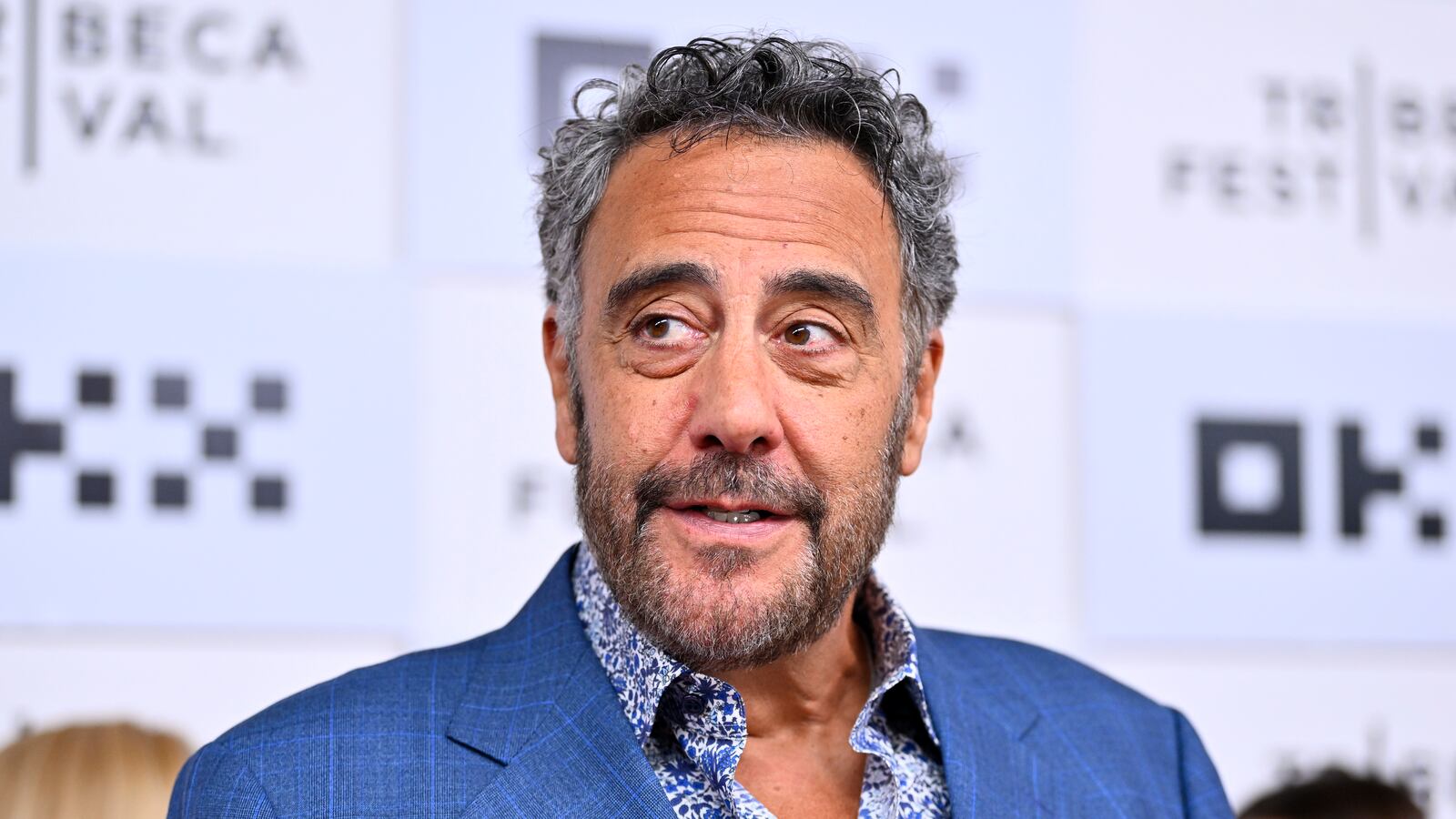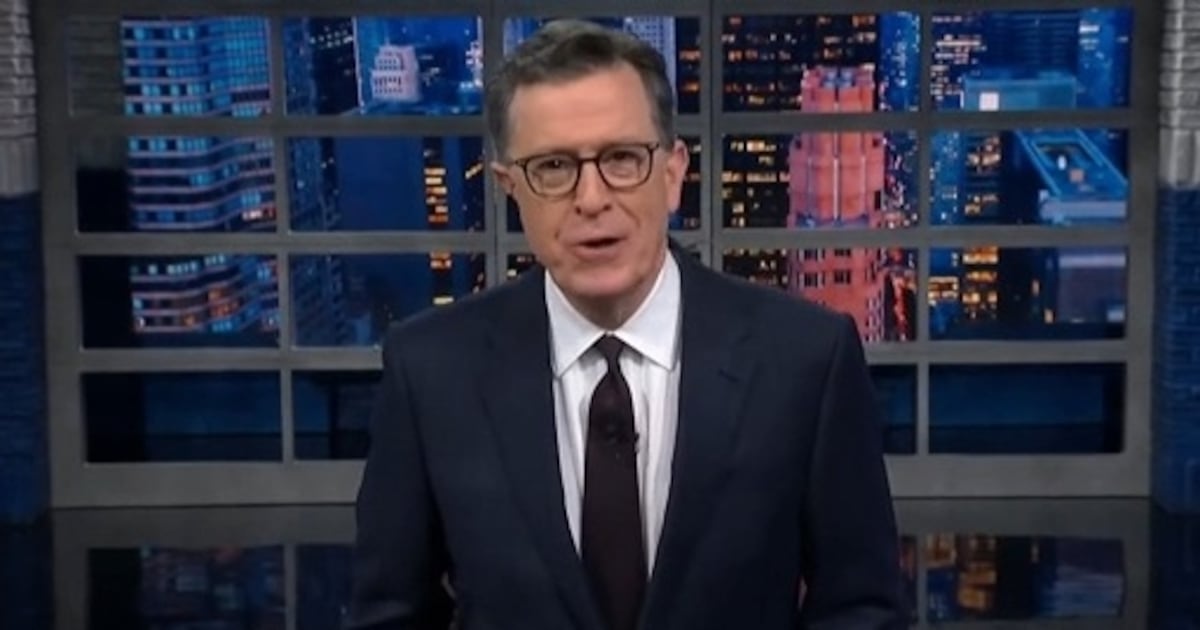“I can’t believe I’m having sex with Pete Davidson!”
That’s not something you’d expect to be exclaimed by a TV character played by Brad Garrett, of all people—the Emmy winner best known for starring in nine seasons of Everybody Loves Raymond. But that exclamation is exactly what happens during what may rank among TV’s strangest love scenes—“love” being a term used loosely here—in Bupkis, Davidson’s new Peacock serieses based (again, loosely) on Davidson’s life.
The first episode, for example, is bookended by bonkers scenes of a sexual nature. It opens with Edie Falco, who plays Pete’s mother, walking in on Pete masturbating, and he accidentally ejaculates onto her chest. And it ends with this, let’s say…unconventional arrangement between Garrett and Davidson’s character.
When Pete finds out that his grandfather, Joe (played by Joe Pesci), is dying of cancer, he plans a “boys’ night” to cheer Joe up. In Pete’s mind, that translates to “book a fancy hotel room and hire a prostitute for his grandpa to have sex with.” Joe, much to Pete’s chagrin, brings along Roy (Garrett), whom Pete calls his uncle, even though they’re not technically related. Joe figures out what Pete’s plan is immediately—the second the escort arrives—and calls it off, leading to a much-needed heart-to-heart about their relationship.

The escort joins them for the night as they bond, party, and, in a particularly moving scene, sing “This Magic Moment” around a piano, with Joe at the keys. It’s Roy who ends up sleeping with the prostitute, but just as Pete and Joe are about to leave the hotel suite, they hear Roy scream in pain. “It’s my hip dysplasia!” Roy moans, frozen mid-coitus. “My dog had that,” Joe replies.
Not wanting the night, or the sexual encounter, to end this way, Roy asks for Pete’s help. That is how Brad Garrett ended up starring in a sex scene, in which Pete Davidson is manipulating his hips back and forth to do the thrusting for him. “I feel like a Make a Wish kid!” Roy screams with glee.
Now that the episode is out and audiences have seen—and been traumatized by—the sequence, we wanted to chat with Garrett about the unusual nature of the scene, the surprising poignancy of the episode, and what he learned from Ray Romano on Everybody Loves Raymond that he also sees in Davidson.
I have to ask: Is this how you've always imagined working with Joe Pesci?
Joe Pesci has helped my sex life many times before this. You know, It's kind of funny. I read the script and was like, well, they definitely have the wrong guy here. But I was so excited, obviously, to be able to work with Pesci and Edie and Pete. But, yeah, I had to get in my head to do this. I don't ask to do many scenes like this. So I left with as little dignity as I could, just trying to get through it.
What was your reaction when this sex scene was pitched to you?
I mean, I had my questions. But, to me, it was laugh-out-loud funny the first time I read it. And I knew it couldn't be as edgy as the very first scene of the pilot [when Pete comes on his mom’s chest]. So I figured, as long as I don't have to show my dumper, which looks like the relief map of Georgia, I’d be fine. That's a good vision for you, Kevin.
Thank you for that.
That scene, when we're all playing the piano out in the entry part of the suite, that's something that just started as an improv. Pesci sat down at the piano, when we were waiting for the cameras to be set up. And he just started noodling on the piano and started singing, and we all just kind of joined in. It was, no pun intended, a magical moment.
This [was] my first scene I shot on this show, so I went catatonic going into this, but Joe just kind of started doing that scene, and we all started singing in and joining in. It was a great precursor to our relationship and who we were in the show, and it was really kind of cool and warm. And then I went right into that other scene.
For all the things in that episode that were silly and over the top, there was something extremely sweet about these three men bonding. It makes the silliness of what happens later also sort of sweet, in a strange way.
You know, it had a lot of heart. It was in the script. But if you spent any time around Pete—and I really didn't know him before—he wears his heart on his sleeve. He's a very emotional, talented guy. And he's so transparent that you can't help but root for him, whether it's in real life or in this.
I think people who watch this series might be surprised by that. There were a lot of expectations about Bupkis, because of Pete Davidson’s Saturday Night Live career and the celebrity gossip headlines. But the more profound elements of the show subvert his public image.
That's really what attracted me the most. I was able to read a couple of the scripts beforehand, and it was so autobiographical. Of course, there are heightened, theatrical scenes, but [Davidson] was just swinging so wide, even in the comedy. But when I saw that we were able to see the struggles that he really goes through on a daily basis, I just thought, wow, this is really very unique, very original. It rides that line, without sounding cliche, of the comedy and the tragedy that he is still dealing with.
Yeah, I was definitely surprised that the show wasn’t just bro-y jokes.
I think you could see, by the people that jumped on the show to join him, the support he has in the entertainment community and how he's really admired for being very open about the stuff that a lot of us struggle with. I'm a recovering alcoholic. I just passed 26 years of sobriety, so I really admire him. I think it's so important that we see people that we care about who are in entertainment, or any part of life, that can be open about their struggles, which is ongoing for all of us. We all have certain degrees of suffering, depression, trauma, and addiction, to varying degrees. It’s just part of the human makeup, and he's really one of the first to tackle this not only in a public forum, but in a creative forum.

They’re very different shows, but between doing Everybody Loves Raymond with Ray Romano and working on Bupkis with Pete Davidson, you have developed a sense of what makes a show like this work. Not every series that’s based on the life of its creator and or star necessarily lands.
It comes from the top, and it comes from collaboration. It's all about the writing, but there has to be a collaborative ingredient, where you feel you're part of it, you feel you're respected, you feel that your voice means something, and where you have that freedom that comes with that. There is a very cool vibe with Pete’s show that there was with Raymond. We knew early on in Raymond, near the end of the [first] season, how lucky we were, because we just felt it working and hitting on all the notes you need.
And you felt that with Bupkis?
Here, [the showrunners] encouraged improv. They encouraged us to help develop who these characters were. With Roy, he was just happy to be involved in anything. He was a lonely guy. I mean, this night, to him, was really a home run. He didn't expect the hip to go out, but he couldn't believe the love he was getting from these people.
I am so, so curious as to what the conversations were like to work out the choreography with Pete for the thrusting in that sex scene.
What was remarkable is how, all these years, I really did need someone to push me. I'd probably still be in the first marriage, Kevin. It was interesting. There was an intimacy coordinator, which is a new thing now on sets. They give you different apparatuses to wear, to make sure that nothing is touching. You have someone coming in the room, asking the woman if she's comfortable and asking me if I'm comfortable. So there's this other element, that you're thinking of this on top of everything else.
As far as the choreography, it was on the page. With Pete pushing me, there was really no other way to do it.
Right, there was no other way than to have Pete Davidson enable sex for you.
What I loved is that it’s the last thing his character wanted to do. If he was into it, that would have been weird. Pete just has a great way of making sure no matter what he does, you end up rooting for him. That's something that's not just on the page, but something that I think an actor brings. I look at that scene and instead of feeling bad for me, you feel bad for him, that he has to push this mammoth of a person onto this poor woman, who could never be paid enough—in real life or as a sex worker—to have a nine-foot Jewish guy on top of her.
It goes back to what you were saying earlier about “heart.” Pete is doing this incredibly bizarre thing purely because, deep down, he has so much love for this man.
I think that's what Raymond had, too. It was the heart of it. It's why Marie, played by Doris Roberts, could get away with so much stuff as a mother. In her mind, it always came from a great place. It always came from the heart. When Peter Boyle [who played Frank] did something that was so incredibly off the wall, it’s because he was never able to tap into his heart, so it made that twice as funny. When it comes from character, and not jokes, you can hit a level of comedy that's unique. I learned that from Phil [Rosenthal, co-creator of Raymond] and Ray. I always said about Robert, “Raymond was an only child. They just forgot to tell Robert.”
Keep obsessing! Sign up for the Daily Beast’s Obsessed newsletter and follow us on Facebook, Twitter, Instagram and TikTok.






